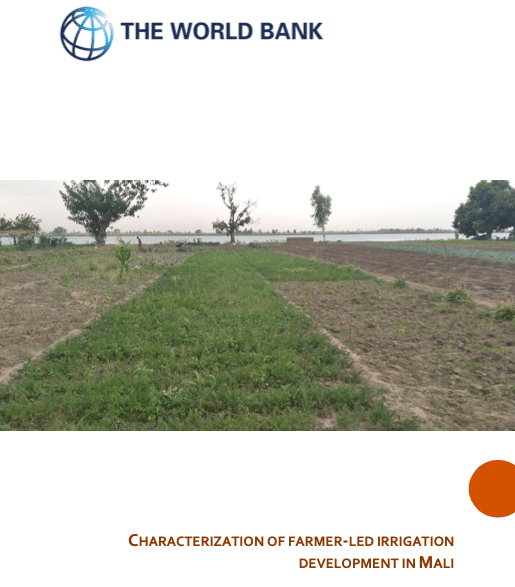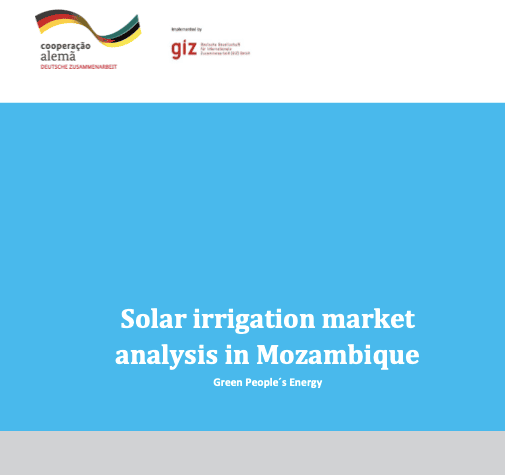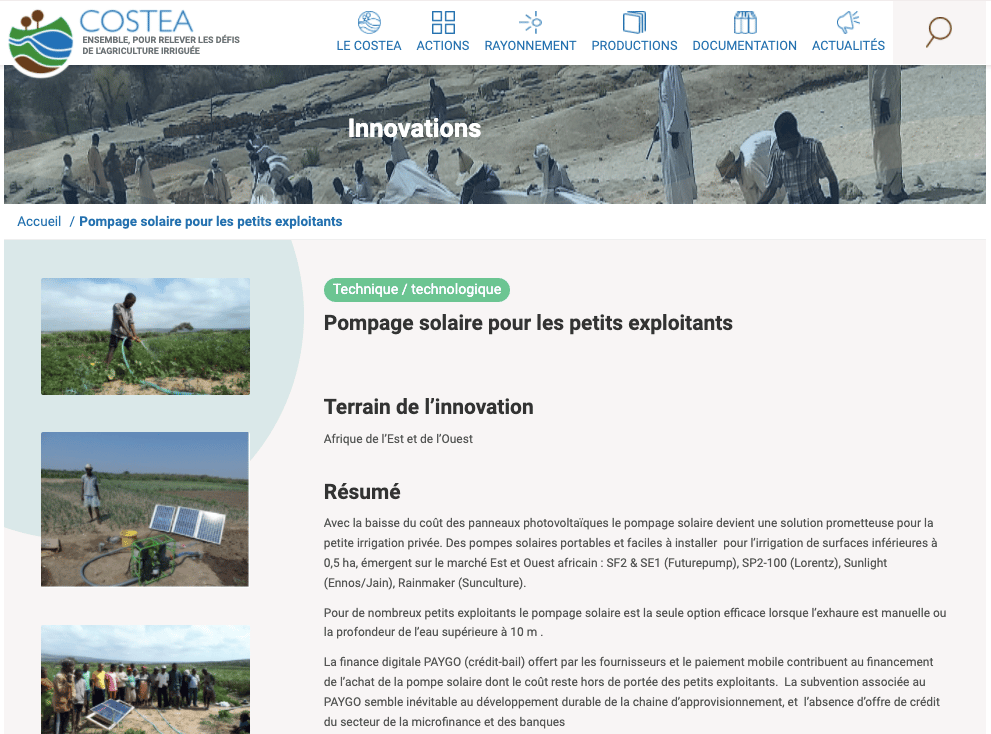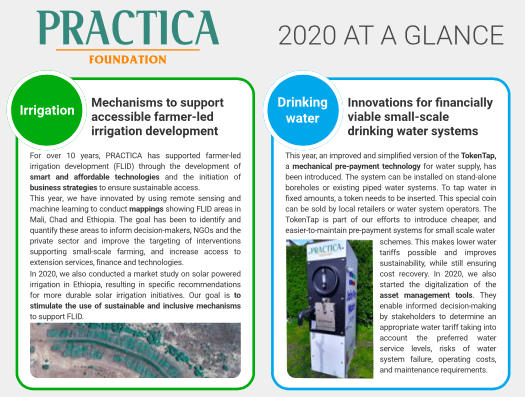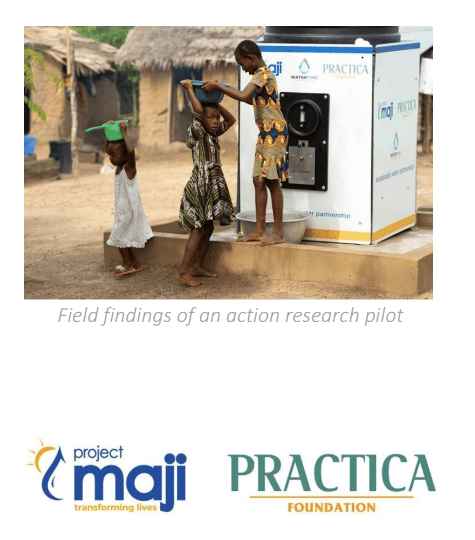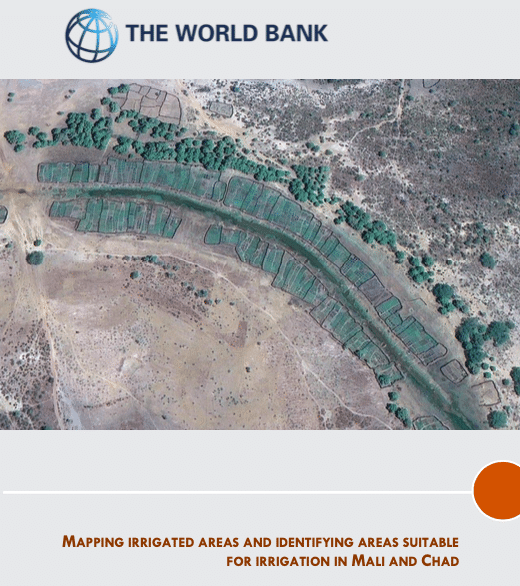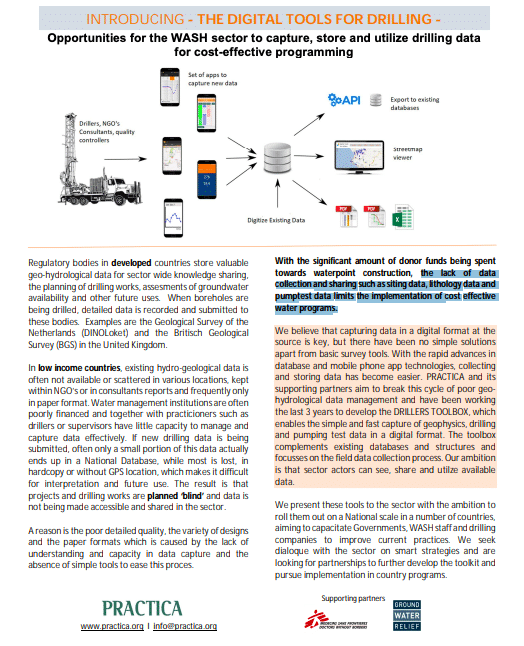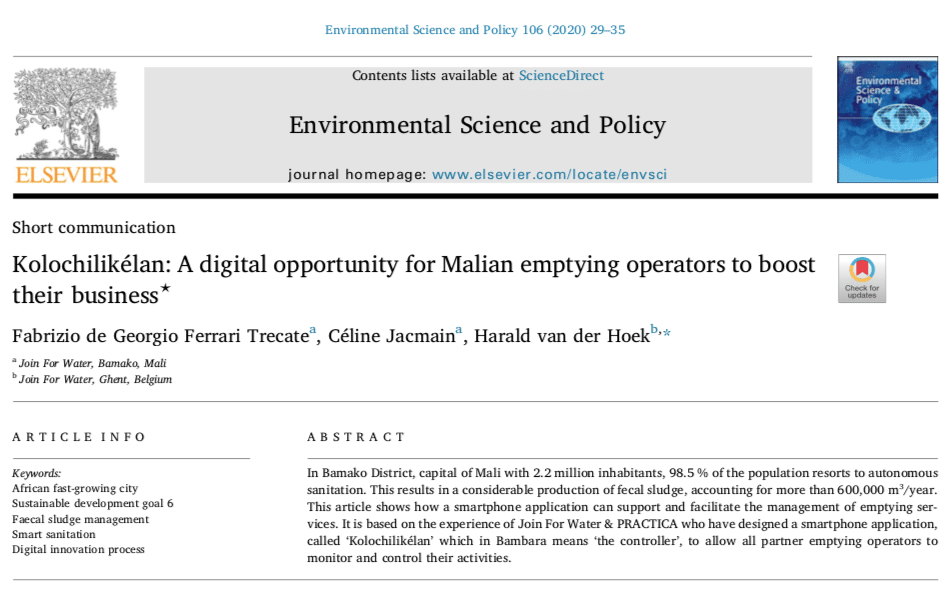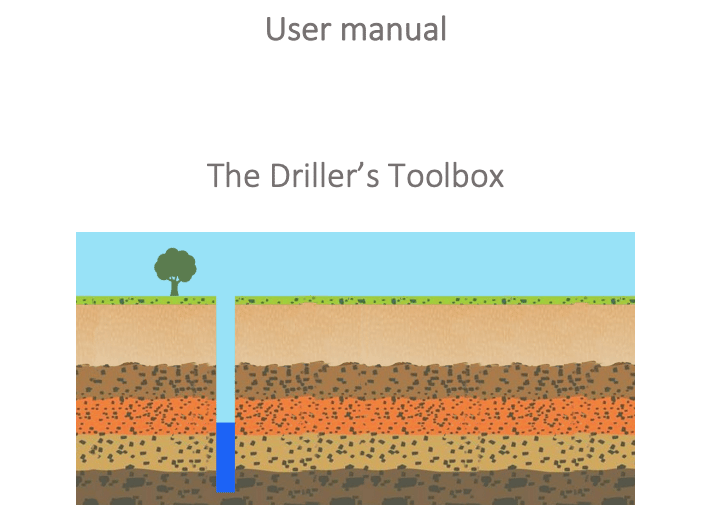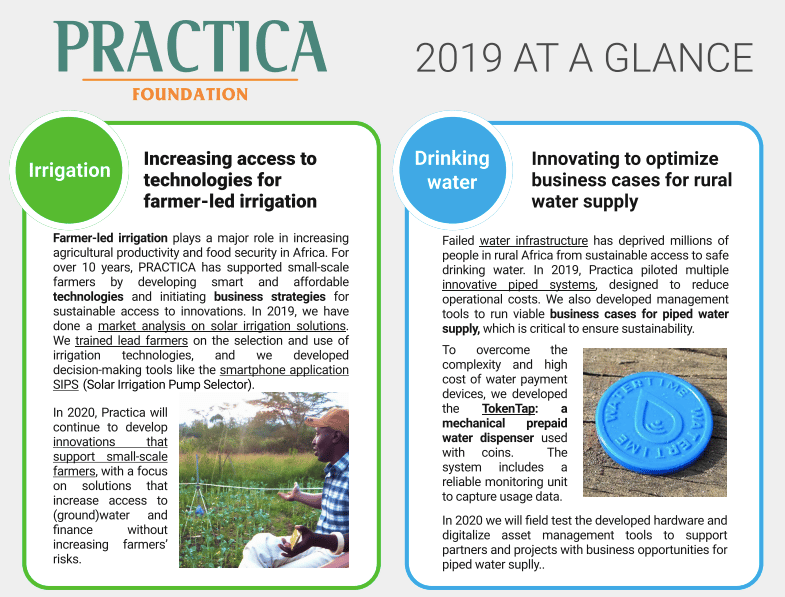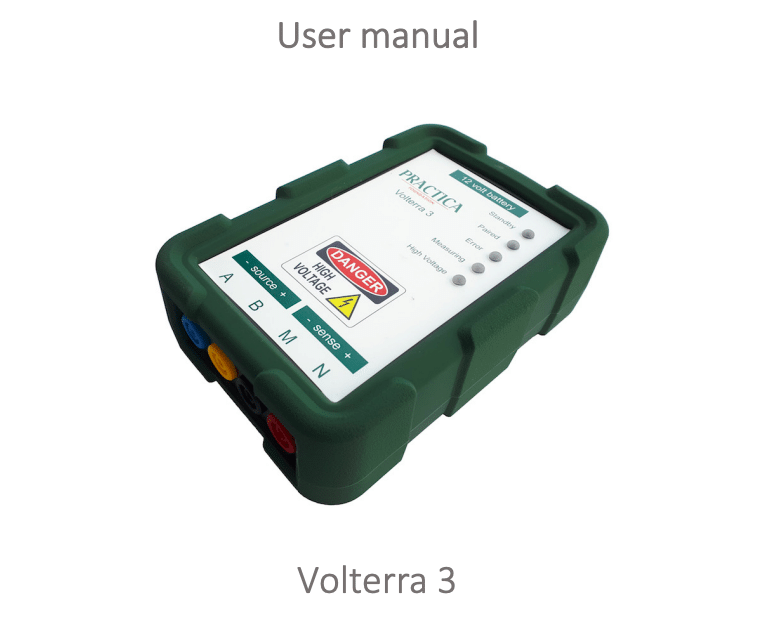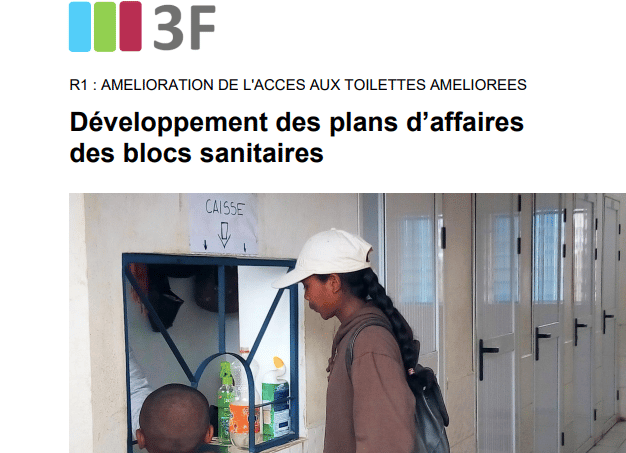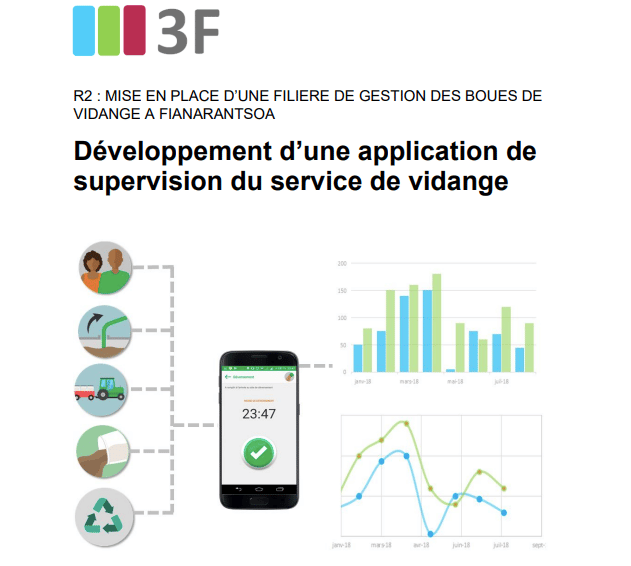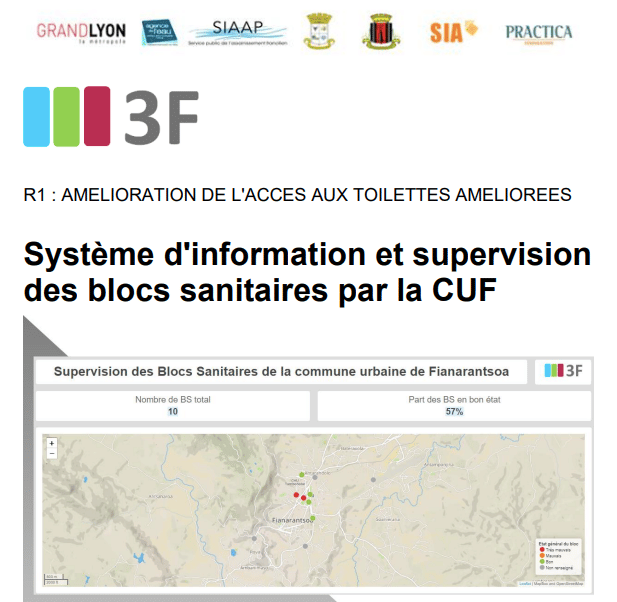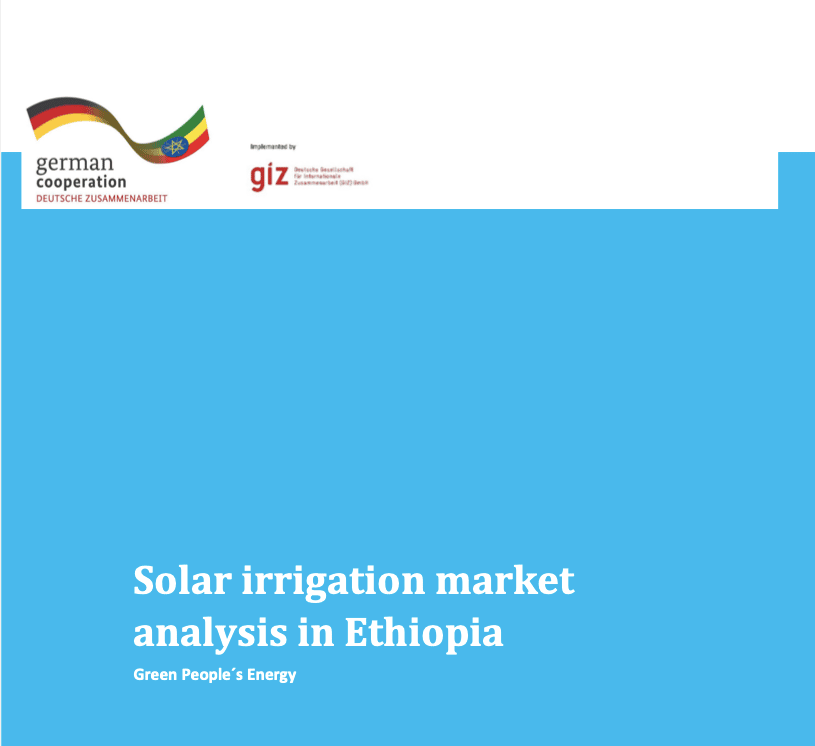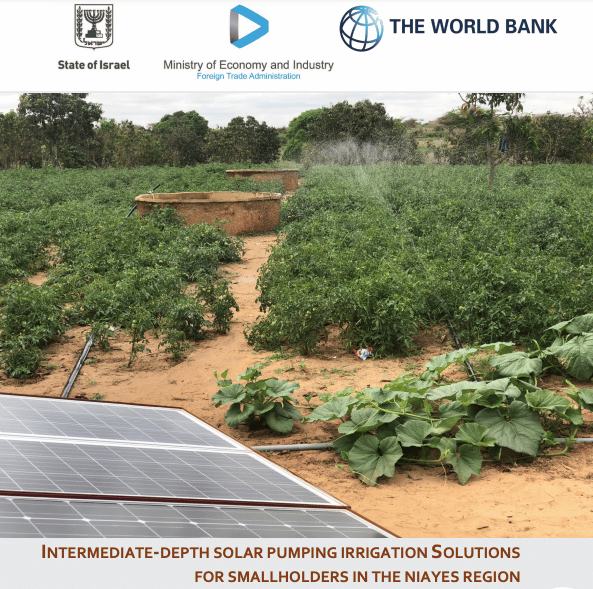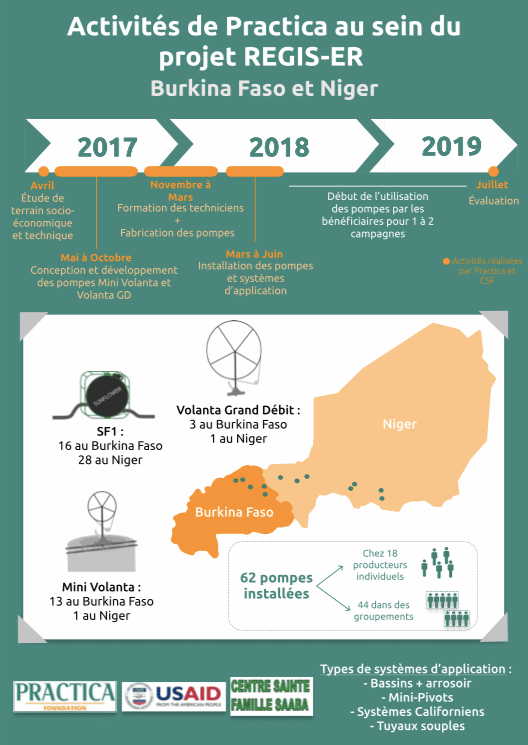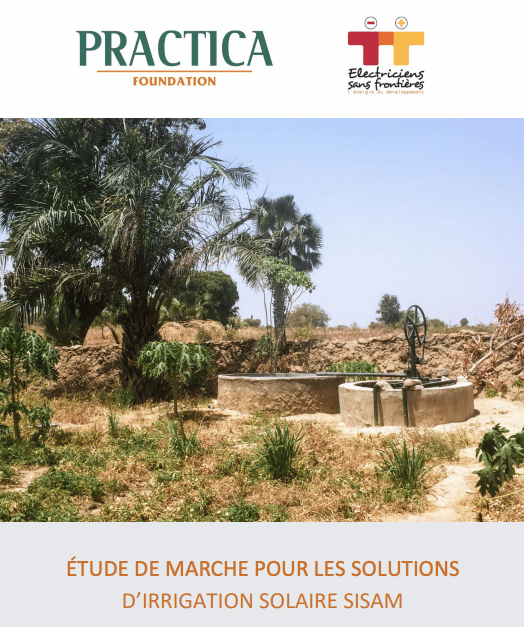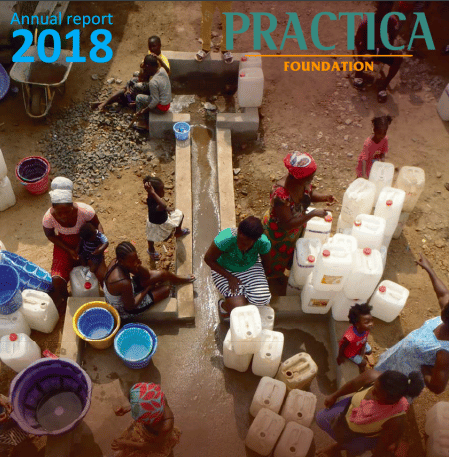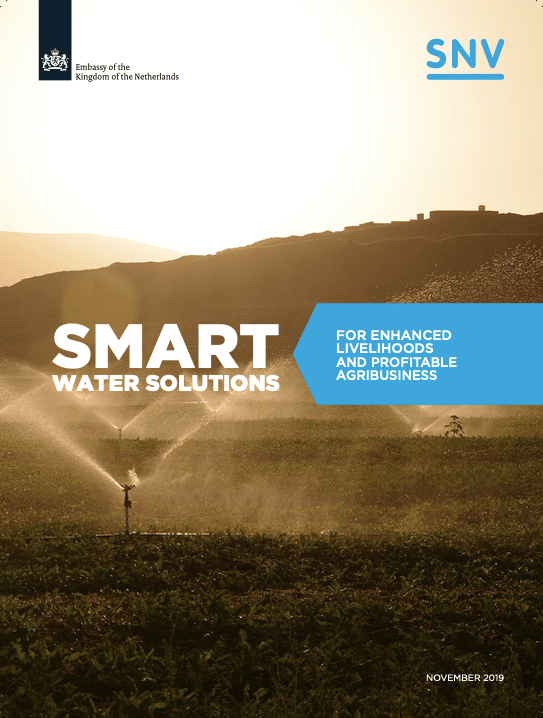Our publications
Resources produced during our past projects are accessible here.
For more than 10 years, we have capitalised documents on groundwater development, irrigation, drinking water supply and sanitation. You can find lessons learnt from the field, project reports, technical sheets, (training) manuals, videos, etc.
Check out and share the information you are interested in with the rest of the sector in order to support local enterprises and strengthen their technical and business skills.
Characterization of Farmer-Led Irrigation Development (FLID) in Mali
This work forms part of the project “Diagnostic and future directions for Farmer Led Irrigation Development (FLID) in Chad and Mali”, which aims to assess the current extent of farmer-led irrigation in Chad and Mali, and assess the areas that are suitable for further growth. FLID is the process by which farmers drive irrigation development. This report aims to shine a light on the specific irrigation practices and technologies used and opportunities and challenges experienced by individual farmers.
The report aims to inform and contribute to the development of effective supporting mechanisms in the frame of the PARIIS program. The FLID assessment was done through a desk study, interviews with 10 farmers in the cercles of Ségou, Baraouéli, Dioïla and Koulikoro, and interviews with government officials, MFI institutes, farmer associations, equipment suppliers and well drilling companies.
Solar irrigation market analysis Mozambique
This study formulates recommendations for the promotion of solar-powered irrigation systems (SPIS) in Mozambique by conducting an analysis of the actual off-grid solar irrigation technologies available and promotion to small scale enterprise level farmers (<2ha) in Mozambique. The analysis includes: (i) Analysis of the current supply of small-scale solar-powered irrigation technologies in Mozambique; (ii) Reveal gaps, challenges and shortcomings for the development of the solar irrigation market (supply and demand sides); (iii) Provision of concrete Inputs and Recommendations in light of the specific GBE requirements on further development of activities and concepts. The results are recommendations of this study have been translated by Energypedia. Click here to read the Portuguese version.
Solar pumping for small scale farmers
PRACTICA’s publication on solar pumping for small-scale irrigation has been selected for the call for innovation launched by COSTEA.
Since the decrease of the cost of solar irrigation panels, solar irrigation solutions are emerging on the African markets. For many farmers, it is the only solution to reach water deeper than 10m. Nevertheless, investments costs remain high at the moment, and without offers from banks and financial institutions, digital financing solutions like PAYGO seem to be the only option to improve access to these solutions.
A glance at 2020 (annual report)
With the pandemic situation, 2020 was clearly a special year. We adapted our working methods but pursued our projects and even started new one. Read our annual report 2020, and have a look at our activities and achievements during this period.
Action research findings from Ghana on Modular Building and the TokenTap
This paper presents the action research findings of a pilot on Modular Building, related to safe drinking water provision in Ghana. In this pilot – in collaboration with project Maji – a small modular piped network of water kiosks was constructed. The hardware was optimized based on multiple years of field data and was fitted with a novel mechanical prepaid device called the TokenTap. This paper describes the rationale behind the design and approach, the field findings and a financial comparison of the system with a single water kiosk approach.
Mapping irrigated areas and identifying areas suitable for irrigation, in Mali and Chad
This work forms part of the project “Diagnostic and future directions for Farmer Led Irrigation (FLID) in Chad and Mali”, which has the aim to assess the current extent of farmer- led irrigation nation-wide in Chad and Mali, and assess the areas that are suitable for further growth. In both countries, farmer-led irrigation exists, but the extent is not well known. As a first step towards the characterization of FLID, this report focusses on the identification of total irrigated areas (both small-scale and large-scale) for the full territories of Chad and Mali, using remote sensing and machine learning, and identifying areas suitable for small-scale irrigation by using a multi-criteria model. Combining the areas of actual irrigation with suitable areas, we determine regional zones where expansion of irrigation has a high potential.
Digital Tools for Drillers – Infosheet
The Digital Tools for Drillers are a set of tools developed to improve data collection and sharing during the construction of water points. They include a smartphone app for field operators, a dashboard for WASH agents and capacity building. The lack of data collection and sharing during water point construction, such as siting data, lithology data and pump tests result limits the implementation of cost effective water programs. That’s why the Driller’s toolbox has been developed.
Evaluation of the app Kolochilikélan in Mali
This paper, publicly available from the Science Direct journal, is an evaluation of the smartphone app Kolochilikélan, developed by Practica, together with Join For Water in Mali, for a faecal sludge management project in Bamako.
In this paper you will read:
• The introduction of a mobile application to improve efficiency of emptying operators’ business in Bamako, Mali is discussed.
• The application provides useful information for truck drivers and owners, operation managers and local authorities alike.
• Application use reduces over time since drivers and owners have interest to keep their business out of official control.
• Semi-mechanical operators still use the app contributing to higher income and serving a niche market inaccessible by trucks.
The Driller’s Toolbox – User Manual
This the user manual of the Driller’s Toolbox, a smartphone app for groundwater development. It assists in common tasks such as geophysics resistivity measurements, drill log data capture and reporting, and pumping tests. The app contains simple user
interfaces to make it easy to capture high-quality data, and after submission the user receives a PDF report plus the
raw data in Excel, for further analysis. The app is available for Android devices, in English, French, and Portuguese.
2019 at a glance (annual report)
In 2019, we invested in R&D throughout our four working themes. We developed some hardware, such as the TokenTap, the mini-pivot, some softwares like the Driller’s toolbox and the SIPS app (Solar Irrigation Pump Selector), and also some new approaches for drinking water infrastructure management, which we plan to further digitalise and develop in 2020. In this annual report you will find a snapshot of our achievements this year, and will get a concrete overview of our projects and innovations.
Volterra 3 – User Manual
The Volterra 3 is an instrument that measures earth resistivity. It can be used to perform Vertical Electrical Soundings (VES) or Horizontal Electrical Profiling (HEP). It was created by PRACTICA Foundation to serve the needs of geohydrologists, in particular for the siting of new boreholes. By introducing an affordable instrument with a user-friendly interface, it has been our aim to bring the potential of geophysics to a much broader audience. Find out more on our page dedicated to the Volterra
Developing a business case for toilet blocks
One of the result expected from the 3F project is the rehabilitation and extension of existing public toilets in the city of Fianarantsoa Madagascar, and the construction of two new building. This report explains the process of developing a business case for these public toilets. The goal is to set up a financially sustainable service of high quality.
Development of an app to supervise & coordinate emptying services
The smartphone app aims to improve the collaboration between the CUF and the operator of the emptying service. The approach adopted to achieve this consists in developing a management tool which effectively assists the company in analysing its performance and, based on data collected, to automatically generate the activity reports provided by the DSP contract in order to improve supervision by the CUF.
Système d’information et supervision des blocs sanitaires par la Communauté Urbaine de Fianarantsoa
Report presenting the methods used to collect data and supervised sanitary blocks during the 3F project in Fianarantsoa, Madagascar. The objective of the 3F program was to create a sustainable and fair value chain for feacal sludge management in the city of Fianarantsoa. Improving access to public toilet was one of the objective of the project. Along with that, we set up a system to monitor and supervise the sanitary blocks, this is described in this report.
Solar irrigation market analysis in Ethiopia
This study report discusses the findings of a market assessment on solar irrigation for smallholder farmers in Ethiopia. The research focuses on the private smallholder irrigation segment (< 5ha) in the national regional states of Amhara, Oromia, SNNP and Tigray. The study shows that the solar irrigation market in Ethiopia is underdeveloped due to limited supply, demand and supportive initiatives. To increase farmers’ demand it is necessary that suppliers start offering integrated solutions including solar pumps, suitable application systems, local services, information and accessible finance. A broad alliance of government institutions and donors is needed to smoothen the supply hurdles, which could lead to increased competition, reduced prices and better services. Specific low-risk finance instruments need to be developed in order to stimulate the solar irrigation market.
Intermediate-depth solar pumping irrigation solutions for smallholders in the Niayes region, Senegal
In 2019, we tested in Senegal several solutions for pumping between 7 and 20 meter depth for smallholder irrigation. We conducted a technical and economical analysis of the different solutions tested. Results presented in this report include the outcome of the tests conducted in the lab, and in the field, on different submersible pumps from Asian brands, and comparison between different types of application systems. Recommendations for scale up of the solutions in West Africa are available at the end of the documents.
Results REGIS-ER Burkina Faso & Niger (2017-2019)
For REGIS-ER project funded by USAID, Practica and CSF have developed and introduced solar pumps for irrigation to the market in Burkina Faso and Niger. The CSF was trained in the manufacture and installation of the pumps, and 62 pumps were installed in the fields of small producers in order to test, evaluate and improve the technologies.
This infographic presents the results of a survey administered to 69 pump users. The results show that the use of small solar pumps reduces operational costs and the drudgery of irrigation compared to manual dewatering. The technologies also reduce the risk of non-repairable breakdowns and the cost of building gardens compared to conventional solar systems.
Market study solar irrigation solutions SISAM
Market study on solar irrigation solutions in the north of Benin and Togo and the south of Burkina Faso. The results highlight the need to bring irrigation technologies and services closer to the farmers in order to increase their adoption. Supply chains of irrigation technologies for smallholders can be optimised by reducing the number of intermediaries in the supply chains of irrigation technologies and by targeting distributors instead of farmers with subsidies. Farmers organisations benefit from a direct access to markets for solar irrigation technologies. They are logically positioned to become local distributors of irrigation technologies.
Annual report 2018
Our annual report for 2018 presents, per theme our activities during this year. We started digitalising tools for groundwater development. We identified and tested in Senegal solutions for farmer-led irrigation that we now aim to scale up in the coming years. In the drinking water supply theme we worked on the concept of “Modular micro-grid” systems to increase both the feasibility and the sustainability of water infrastructures. Finally, we carried several large-scale faeacal sludge management projects in African cities and started the 3F project in Fianarantsoa, which aims to setting up in 3 years a full FSM chain.
Smart Water Solutions for Enhanced Livelihoods & Profitable Agribusiness
The Smart Water for Agriculture project has contributed to the uptake of smart water solutions by 7,500 Kenyan farmers between 2016 and 2019. We played the role of technical assistants, and as part of the consortium, we contributed to 3 publications on: finances and business cases, multi-stakeholder collaboration for farmer-led irrigation development (FLID), and this paper which presents Smart Water Solutions for enhanced livelihood and profitable agribusinesses.
Taking stock of the lessons learnt during the project, this paper discusses the nexus among Smart Water Solutions (SWS), agribusiness, water productivity and livelihoods of irrigating farmers, including women and youth. It
analyses the processes used in promoting SWS, the impacts realized and the lessons learned.

